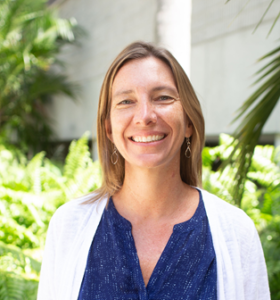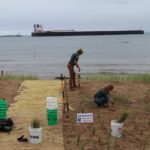Mentorship Spotlight: Urbanized Coastal Adaptation

Mentee Melanie Lander is an environmental planner with a specialization in coastal resiliency. She has worked for the Hawaii Coastal Zone Management Program since 2017 and is based in Honolulu, HI. Melanie is currently responsible for overseeing the implementation of the Ocean Resources Management Plan (ORMP) for the State of Hawaii. Her role focuses on coordination between governmental agencies at the federal, state, and county levels whos e activities both on land and in the sea impact the overall health of our coastal resources.

Mentor Tiffany Troxler co-leads the Sea Level Solutions Center at Florida International University (FIU), focusing on advancing knowledge, decision making and actions toward mitigating the causes and adapting to the effects of sea-level rise. She conducts research in coastal and wetland ecosystem ecology, as applied to both natural and urban systems. With her students and colleagues, she studies topics like the effects of sea-level rise on Everglades coastal wetlands, adaptive management actions to restore the Everglades and nature-based approaches to climate mitigation and adaptation. She’s published numerous peer-reviewed articles, participated as co-editor and contributing author on two Intergovernmental Panel on Climate Change methodological reports that guide national greenhouse gas inventories on land use and land-use change and co-edited the recent “Blue Carbon Primer: The state of coastal wetland carbon science, policy and practice”.
Melanie and Tiffany both live in vulnerable, highly urbanized coastal areas (Honolulu, HI and Southeast Florida, respectively) that are subject to the impacts of sea level rise. Priority considerations in both areas include saltwater intrusion into the aquifer, nuisance king tide flooding, coastal erosion, and increasing episodic coastal hazards such as hurricanes. The shared characteristics of the places that Tiffany and Melanie live have enabled substantive conversations about best practices and solutions to the unique challenges that arise in urbanized coastal areas. Tiffany and Melanie have explored the importance of establishing connections between academia and government entities to promote the application of research and best management practices in real-time. They have also begun discussing nation-wide policies, such as the National Flood Insurance Program Community Rating System, that can be leveraged to incentivize climate adaptation, and increasing interest in citizen science programs.
Melanie shared some key professional insights she has picked up from her mentorship relationship with Tiffany: “My conversations with Tiffany have underscored the importance of understanding both the science behind ecosystem change and practical application to policy as critical to recommending implementable strategies. I think encouraging subject-matter experts to be available for ‘translation’ of their knowledge and urgency to decision-makers is critical, and Tiffany has been working to make herself available in many different forums as an authority on the impacts of SLR in her region. Tiffany works to proactively promote the issues she’s passionate about, and I’ve learned from her not to wait for someone to tap you for new responsibilities. You can learn about new topic areas and get involved on your own!”
Living in coastal areas, Melanie and Tiffany both enjoy spending time kayaking. Melanie especially appreciates the Hawaiian expression of the interrelationship between ocean and land – mauka to makai.
Thank you both for sharing!

